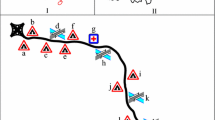Abstract
Individual differences in morningness-eveningness preference may influence susceptibility and response to sleepiness. These differences could influence driving performance, but the influence of morningness-eveningness preference on driving behavior and accident risk has not been comprehensively studied. This study explored the difference between Morning-type and evening type drivers in cognitive ability and driving behaviors. The results showed that evening type drivers reported more dangerous driving behavior, as measured by the Dula Dangerous Driving Index, especially with risky driving and negative emotional driving behaviour. For cognitive abilities, the results showed that there was a main effect of chronotype on the accuracy and reaction time of visual search, and the accuracy of visual-spatial working memory. More specifically, the evening type persons demonstrated better visual search and spatial working memory ability than morning type persons. These results implied the influence of chronotype on driving behavior and the implications of these results are also discussed.
Access this chapter
Tax calculation will be finalised at checkout
Purchases are for personal use only
Similar content being viewed by others
References
Horne, J.A., Ostberg, O.: A self-assessment questionnaire to determine morningness-eveningness in human circadian rhythms. Int. J. Chronobiol. 4(2), 97–110 (1975)
Adan, A., Archer, S.N., Hidalgo, M.P., Di Milia, L., Natale, V., Randler, C.: Circadian typology: a comprehensive review. Chronobiol. Int. 29(9), 1153–1175 (2012)
Cavallera, G., Giudici, S.: Morningness and eveningness personality: a survey in literature from 1995 up till 2006. Pers. Individ. Differ. 44(1), 3–21 (2008)
Tonetti, L., Adan, A., Caci, H., De Pascalis, V., Fabbri, M., Natale, V.: Morningness-eveningness preference and sensation seeking. Euro. Psychiatry 25(2), 111–115(2010)
Duffy, J.F., Rimmer, D.W., Czeisler, C.A.: Association of intrinsic circadian period with morningness–eveningness, usual wake time, and circadian phase. Behav. Neurosci. 115(4), 895–899 (2001)
May, C.P., Hasher, L.: Synchrony effects in inhibitory control over thought and action. J. Exp. Psychol. Hum. Percept. Perform. 24(2), 363–379 (1998)
Angel, C., Enrique, M., Daniel, S.: Effects of chronotype and time of day on the vigilance decrement during simulated driving. Accid. Anal. Prev. 67(6), 113–118 (2014)
Correa, Á., Molina, E., Sanabria, D.: Effects of chronotype and time of day on the vigilance decrement during simulated driving. Accid. Anal. Prev. 67, 113–118 (2014)
Kerkhof, G.A.: Inter-individual differences in the human circadian system: a review. Biol. Psychol. 20(2), 83–112 (1985)
Duchek, J.M., Hunt, L., Ball, K., Buckles, V., Morris, J.C.: Attention and driving performance in alzheimer’s disease. J. Gerontol. 53(2), P130 (1998)
Natale, V., Alzani, A., Cicogna, P.: Cognitive efficiency and circadian typologies: a diurnal study. Pers. Individ. Differ. 35(5), 1089–1105 (2003)
Stolwyk, R., Charlton, J.L., Triggs, T.J., Iansek, R., Bradshaw, J.: Neuropsychological function and driving ability in people with Parkinson’s disease. J. Clin. Exp. Neuropsychol. 28(6), 898–913 (2006)
Grace, J., Amick, M.M., D’abreu, A., Festa, E.K., Heindel, W.C., Ott, B.R.: Neuropsychological deficits associated with driving performance in Parkinson’s and Alzheimer’s disease. J. Int. Neuropsychological Soc. 11(06), 766–775 (2005)
Dorrian, J., Mclean, B., Banks, S., Loetscher, T.: Morningness/eveningness and the synchrony effect for spatial attention. Accid. Anal. Prev. 99, 401–405 (2016)
Carciofo, R., Du, F., Song, N., Qi, Y., Zhang, K.: Age-related chronotype differences in Chinese, and reliability assessment of a reduced version of the Chinese Morningness-Eveningness Questionnaire. Sleep Biol. Rhythms 10, 310–318 (2012)
Adan, A., Almirall, H.: Horne & Östberg morningness-eveningness questionnaire: a reduced scale. Pers. Individ. Differ. 12, 241–253 (1991)
Horne, J.A., Ostberg, O.: A self-assessment questionnaire to determine morningness-eveningness in human circadian rhythms. Int. J. Chronobiol. 4, 97–110 (1976)
Qu, W., Ge, Y., Jiang, C., Du, F., Zhang, K.: The dula dangerous driving index in China: an investigation of reliability and validity. Accid. Anal. Prev. 64, 62–68 (2014)
Qu, W.N., Ge, Y., Xiong, Y.X., Carciofo, R., Zhao, W.G., Zhang, K.: Dangerous driving in a chinese sample: associations with morningness-eveningness preference and personality. Plos One 10(1) (2015). https://doi.org/10.1371/journal.pone.0116717
Del Rio-Bermudez, C., Diaz-Piedra, C., Catena, A., Buela-Casal, G., Di Stasi, L.L.: Chronotype-dependent circadian rhythmicity of driving safety. Chronobiol. Int. 31, 532–541 (2014)
García, A.: Circadian rhythms in phonological and visuospatial storage components of working memory. Biol. Rhythm Res. 37(5), 433–441(2006)
Natale, V., Cicogna, P.C.: Morningness-eveningness dimension: is it really a continuum? Pers. Individ. Differ. 32(5), 809–816 (2002)
Acknowledgments
This study was partially supported by grants from the National Key Research and Development Plan (2017YFB0802800) and the National Natural Science Foundation of China (Grant Nos. 31771225, U1736220, 31400886)
Author information
Authors and Affiliations
Corresponding authors
Editor information
Editors and Affiliations
Rights and permissions
Copyright information
© 2019 Springer International Publishing AG, part of Springer Nature
About this paper
Cite this paper
Xiong, Y., Ge, Y., Qu, W. (2019). Cognitive and Behavioral Differences Between Morning-Type and Evening-Type Drivers in China. In: Stanton, N. (eds) Advances in Human Aspects of Transportation. AHFE 2018. Advances in Intelligent Systems and Computing, vol 786. Springer, Cham. https://doi.org/10.1007/978-3-319-93885-1_79
Download citation
DOI: https://doi.org/10.1007/978-3-319-93885-1_79
Published:
Publisher Name: Springer, Cham
Print ISBN: 978-3-319-93884-4
Online ISBN: 978-3-319-93885-1
eBook Packages: EngineeringEngineering (R0)




